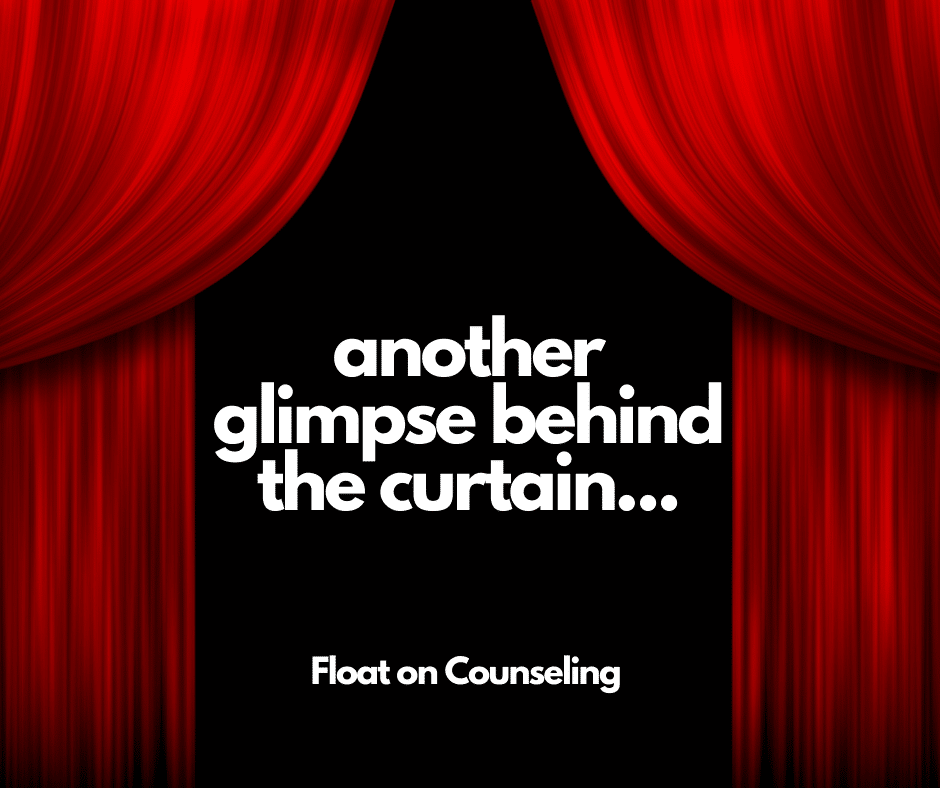A Day in the Life of a Therapist (This Therapist)
Post written by Float On Counseling Therapist and Owner, Joel Schmidt LMHC
Take a glimpse behind the curtain. Here, I'll share what a day in the life of a therapist (THIS therapist) looks like from sunrise to sunset - from the more mundane side of things to the things I do to show up the best way I can for the people I work with.
Being a therapist sounds pretty easy, right? I hear that sometimes. How hard can it be to plop down in your chair, listen to someone talk for an hour, nod your head a few times, and maybe check in on how whatever it is they are talking about makes them feel every once in a while? Well, its really not quite that simple...unless you're just not a very involved or helpful therapist. Don't get me wrong. There's a lot to be said about the power of just being heard - in providing a nonjudgmental place for people to share their stories...their loss, their trauma, their suffering, their ups, and their downs....their wins and accomplishments... I won't discount that for a moment....but for a therapist who really wants to help, it's not as simple as just listening. It's about really actively listening. It's about trying to get a deep understanding of what's going on. It's about helping people untangle their thoughts and understand the complexity of themselves. It's about continuing to learn and to grow...It's about helping people "connect dots" with a deep level of curiosity and trying to figure out what it is that will help someone really heal...and that's hard work that takes about every ounce of energy and attention available. That, and outside of that sacred 50 minutes, there's a lot that goes on behind the scenes that many people who are not therapists aren't aware of. The time you reserve and pay for often extends far beyond the hour we spend together.
Monday-Thursday:
Early AM Coffee (6am-7am) - Stick with me. This is admin time. I'm checking emails, looking at my agenda for the day, writing blog posts (it's 6:07am as I work on this post). Blogging gives me the opportunity to speak to my audience and new people who might be trying to get a sense for my style or personality. I get to share my voice. I get to teach...and sometimes in the process I'm also learning because I'm writing about mental health and not only researching but reinforcing some of the things I already know.
Still Early AM (7am-745am) - This is the time of the day that I work on session notes for the appointments I had the day before. Session notes are the notes I enter into my secure electronic health record with details on sessions I've had with people I'm working with. I look at handwritten notes, reflect on some of the things discussed, and make brief entries that include some important highlights about the sessions I've had and things we might work on next time. Not only is this a legal requirement, but it's absolutely necessary to help me remember important details, to measure progress, and to make sure I'm helping maintain continuity.
Exercise (745am-845am) - This might not sound like "work", but is in fact something I've found to be crucial in terms of making sure I have the energy I need and the right mindset entering the day. Usually I'm walking, jogging, or both. Often times I'm listening to a favorite podcast. Sometimes I'm listening to an audio book and digging deeper into mental health and therapy topics. There's always more to learn. This helps me stay sharp, up to date on current research, and improving as a therapist.
Prep Time and Research (845am-930am) - This is where I really start to get ready for the sessions I have scheduled for the day. I'm reviewing the last session notes and writing in my notebook a loose agenda about some of the things I might follow up on and ask about. Often times sessions are a continuation from the one before, so it's important for me to make sure I remember what was discussed so I can follow up on reflections and pick back up where we left off. Sessions don't always go as planned since so often life and other things come up that are more important...but that's okay. During this time I'm also doing some research if there's anything I feel I need to sharpen up on to prepare.
Face to Face time (930am-1230pm) - Morning sessions. I make sure never to see more than 3 people in the morning. Any more than that and I start to feel a little less sharp. Learning my limits and what it is I need to be most effective has been crucial. This is my favorite time of the day because it's when I get to really serve and connect with the people I'm working with. We talk about how things have been going, progress that has been made, challenges faced, and we work on therapy goals and objectives.
Rest 1230pm-2pm - Nice long break. This, too, is important for making sure I'm ready and fully present for what the afternoon has in store.
Learning (2pm-3pm) - During this time, I'm often spending time learning. One of the things therapists are required to do to maintain their license is to complete a certain amount of continuing education units each year. Even if it weren't required, it would be necessary for me to feel on top of my game. I'm watching video courses that range in topics, such as: professional ethics, cultural competency, an general mental health topics. A few of my most recent courses have been on treating health anxiety, social media ethics as a therapist, and what it means to be a well-rounded and good therapist. I often pick topics that are relevant to the work I'm currently doing and struggles that the people I'm currently working with might be dealing with to improve the chances of helping best.
Afternoon/Evening Sessions (3-6pm) - Again, no more than 3 to make sure I don't hit "E" on the mental gas tank. All distractions aside and I'm zoned in to the person in front of me, carefully listening, providing feedback, teaching skills, and thinking deeply about how to help best. Although I'm sometimes in "teacher" mode, I'm ALWAYS in learner mode. I learn something new everyday from the people I'm working with. I gain new perspectives, have assumptions challenged, and learn things that help me help others. I'm an expert in some things, but the people I'm working with are the experts of THEIR lives, so I have to be careful not to assume I know what's best.
Fridays (rollover day, consultation, and business) - On Fridays I might have a couple of sessions and catch up on some administrative stuff I wasn't able to complete during the week. Most Fridays I'm also participating in a professional consultation group. This is where I meet with other therapists in a small group setting. We discuss challenges in our work, get feedback from one another on some interventions that might be helpful, and learn about what's worked for other therapists and individuals they have served. When we discuss any individuals we might be working with, we are very careful to protect confidentiality, make sure not to give away any identifying information, and speak in general/vague terms (again, to protect privacy at all costs). Consulting is a very important part of being a therapist. We all have blind spots and gaps of knowledge, so getting feedback from other professionals helps in areas we might be stuck on.
Aside from all of the clinical stuff I've discussed, Friday is also a day for not-so-fun business stuff. Running a private practice involves having to do all of the stuff that comes along with running a business. This includes paying the bills, managing the books, working on the website, replying to emails, and doing things to keep a strong presence in the community.
Even though the heart of this work lies within the time I'm spending face-to-face with the people I aim to serve, you can see that it's more involved than the time I spend with my "therapist hat" on.
If you're looking to start therapy for yourself, I hope you'll check out our group of skilled therapists who work a broad range of areas, such as: treating anxiety and depression, helping people who are struggling with grief, resolving trauma, improving relationships, and more.
We offer online therapy to people all throughout the state of Florida and see clients at our physical office in the Carrollwood area of Tampa. We can help guide you through anxiety, depression, getting unstuck, establishing direction in your personal/professional life, and coping with whatever it is you might be struggling with. Send us a message or call/text 813-515-9602.
View Joel’s Float On Counseling bio here: Joel Schmidt, MA, LMHC (Therapist and Owner)
View Joel’s Psychology Today Profile


This was so helpful! It was fun to hear about your life at work and it informed me a lot!
Thank you, Joel! I’ve been searching for this type of information for some time, as I am considering pursuing my MFT as a vocation at 35 (which feels a little daunting). I know my professional strengths and weaknesses, so this is very helpful to better understand what each day could look like.
Sorry that I did not see your comment sooner. I am glad that I could help!
Thank you this was really helpful I’ve been struggling for some time not knowing what profession I wanted to be so my mom recommended being a therapist so I’ve been researching on it and I’m really interested in being one 🫶
That’s awesome! Feel free to email me at joel@floatoncounseling.com if I can answer any questions for you. I’m always excited to help people who are thinking about entering the field.
Thank you this was really helpful I’ve been struggling for some time not knowing what profession I wanted to be so my mom recommended being a therapist so I’ve been researching on it and I’m really interested in being one 🫶